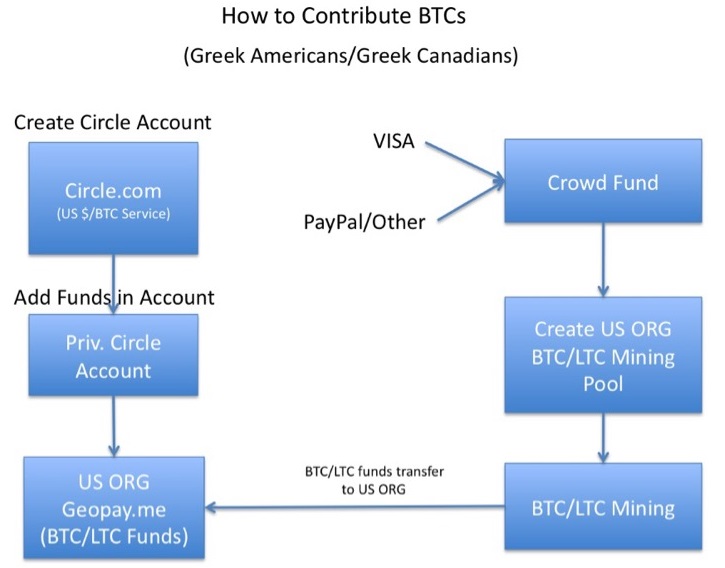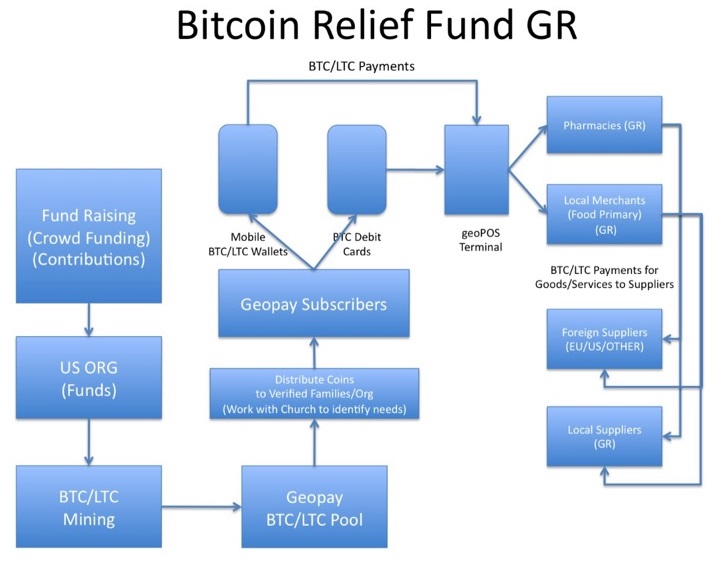Geopay, a new crypto-business bringing a “universal commerce platform” to the financial tech world, is planning to help Greeks with their sovereign debt crisis.
Geopay offers market solutions for merchants, storefronts and a wide variety of markets. Part of Geopay’s vision is to create a multi-currency, web-based and physical proof-of-stake (POS) ecosystem that provides safe, borderless digital commerce.
“We are entering the age of cryptocurrencies and decentralized exchanges. However, few companies are implementing solutions that benefit everyday merchants and consumers.”
— John Karantonis, Founder of Geopay
The concept is to expand Bitcoin adoption through consumer and merchant acceptance. At the same time, they want to converge fiat, barter, bitcoin, and altcoin remittance into a single, easy-to-use service. They offer a marketplace that differs from most digital-commerce solutions, with an affiliate program that allows users to seek residual income.
Founder John Karantonis, located in Chicago, which he calls the “FinTech capital” of the world, works with Co-Founder Adonis Valamontes, from a town called Sitia in Eastern Crete. Both of them contribute to Geopay’s front end from abroad. Their office located in Florida is their main meeting spot and data center.
Cointelegraph spoke with Karantonis and Valamontes about their business model and the current situation in Greece.

- Geopay Founder John Karantonis (left) and Co-Founder Adonis Valamontes (right)
Cointelegraph: What is Geopay and what kind of services does it offer?
John Karantonis: We are entering the age of cryptocurrencies and decentralized exchanges. However, few companies are implementing solutions that benefit everyday merchants and consumers.
Geopay.me is a startup developing a common marketplace hub and remittance facilitator between very distinct systems — fiat, credit cards, community barter systems and cryptocurrencies like Bitcoin and altcoins. Our POS solution enables multi-token cryptocurrency acceptance, remittance and mobile payments. Remittance is now also more viable for the masses via an SMSPay capability to address underserved markets, where feature phones are still the norm.
What differentiates us is the ability to offer a universal commerce platform with multi-currency support, faster access to funds and added marketing benefits for members on the network. The Market Express solution offers merchants simple storefronts, product and inventory management with turn-key currency, payments and shipping support.
The platform also integrates specialized marketing analytics, search engine indexing and campaign management tools for improved online presence. So we add substantial marketing value and support to customers.
“I believe that Greeks are at the right place and the right time for cryptocurrencies. [...] Culturally, Greeks are a communal society, so the uptake of cryptos can have a much easier acceptance, with the proper education.”
— Adonis Valamontes

CT: Adonis, how are things going in Greece?
Adonis Valamontes: There is a lot of anxiety in Greece. The dichotomy between baby boomers, for a lack of better word, Generation X and Millennials, has made it hard to see economic progress.
Each group has different interests, priorities, and not much of a national consensus on economic progress. This topic warrants its own discussion. It’s more political in nature. On a community level things can work well, because it's easier to get consensus within a small community, since all parties involved have a common interest — the survival of the community.
I named our community effort “1-10-100.” It’s more of a strategy — not that only 10 communities exist around a single community, but that adjacent communities have closer relationships to each other, and my 1-10-100 is a way to express that and make it simple to understand.
Most of the talk on Bitcoin usage has been in the past year or so from companies abroad, particularly Northern Europeans and Asian groups. The issue is not whether there is talk about BTC, but how do you implement new “monetary” or trade concepts beyond the traditional barter systems?
Many people do not know that Greece has four local community currencies. Two of them are the LET and the ELECTRA. It’s very localized in specific cities and islands, and it's this concept that we try to expand upon, since we know that such efforts are made.
I believe that Greeks are at the right place and the right time for cryptocurrencies. Many look at Greeks as a market of speculators that can use cryptos for trading and speculation. I see Greece as a market with great potential, for a few reasons. Culturally, Greeks are a communal society, so the uptake of cryptos can have a much easier acceptance, with the proper education.
Secondly, Greece has over 10 million travelers that come to Greece, visitors that for the most part use technologies in their own countries daily, from banking to government services. When these visitors come to Greece, they have to step back from the services they use in their own countries. Greece for the most part does not have a unified credit system; merchants are reluctant to add credit cards, unless it's in the popular islands that make it [accepting credit cards] a necessity to do business, and the reasons are many.
Thirdly, small Greek businessmen are ready to accept new technology, because they know that the only way they can stay competitive in an area that has high competition in tourism. Many want to know how to proceed.
In southern Crete, where we have offices, in 2014 we started a program to educate. We offered free tools for hotels and other businesses, such as car rentals. I believe a cryptocurrency, like Bitcoin or Litecoin, can benefit local economies because it would help money flow within these local economies and that’s critical for their survival.
You cannot build factories and industries in small villages or islands, because resources are limited, and second because of environmental concerns. Bitcoin and other cryptos bring work to such places and have little or no environmental impact. We all know that mining Bitcoin and others coins is energy consuming. Greek Islands like Crete and the city of Sitia and many more have plenty of sun and wind, alternative energies that can power smart-grid microcenters to mine Bitcoin and help maintain and expand the Bitcoin nodes.
CT: You guys are building a BTC/LTC node while in development. Can you tell us about this?
AV: The BTC/LTC nodes came totally by coincidence. A few friends and I were sitting in a coffee shop one day in 2014, and they asked me if I could help them with a miner for Doge. Ultimately, it lead to exploring how to set up a node for coins like Bitcoin and Litecoin, and that’s what we did.
It’s a private node that we use to mine BTC and LTC. The group is very small, and part of the plan is to educate the community to utilize the nodes to help raise funds for projects and community needs. We still have some education to do, and the current economic situation has distracted us, but we are moving back on course.
“We believe that our project that we named ‘Bitcoin Relief Fund - Greece’ can offer [...] opportunities for Greeks abroad and others to participate in a crowdfund, and direct contribution.”
— Adonis Valamontes
CT: How do you guys plan to help people in Greece with this project?
AV: Our BTC/LTC node has been up and running since October of 2014. After the rapid drop of the BTC value, I really did not give it much thought, and the miner equipment in the market at the time did not offer much energy efficiency. During my research of miner solutions, the group invested in several types of miners that we thought could perform well in the Geopay nodes and have less energy requirements. We bought them, and after many months testing, the results were looking good.
As the value of BTC begun to move upwards again, we saw an idea that these nodes can help generate value that can be passed on to the communities that need the most help — that is to supplement medicine costs for the needy, and participate in the life essentials for families in need.
We believe that our project that we named “Bitcoin Relief Fund - Greece” can offer two opportunities for Greeks abroad and others to participate in a crowdfund and direct contribution. This is to acquire specified lots of BTC/LTC miners that can operate in the U.S. and Crete, and have those funds directly send to a centralized organization that can distribute to the communities in Greece.
I believe, if we work with the pharmacy organization and the local grocers co-op, then it can be possible to use Bitcoin for purchase of medicine and essential foods. Geopay can play a critical role to help provide accountability between consumers and merchants, and education for local communities, on how to use this new option.
There are some details to be worked out that will participate in the initiative in the U.S. to assist with the crowdfunding and disbursement of funds (BTC/LTC). Geopay has the technology ready and can handle that technical/operational part of the consumer/merchant relationship, once the communities/individuals begin to receive funds (BTC/LTC)
What we propose does not eliminate or bypass levy responsibility. On the contrary, it makes it more transparent, since BTC has full transparency through the blockchain. And both the pharmacies and local merchants still will be obligated by law to issue register receipts accordingly.
We also know from the current capital controls crisis in Greece, such actions have created issues for B2B [business-to-business] payments and businesses that depend to export goods. They have no way to transact day-to-day payments with banks closed.
Being part of Geopay’s network, we will offer all merchants through our Chinese partners a Bitcoin debit card. This card has KYC [know your customer] and AML [anti-money laundering] compliance and is part of UnionPay National Bank in China. The card creates flexibility to merchants that need to transact with businesses abroad and have full transparency.
Once capital controls are lifted, all merchants can align their business bank accounts through SEPA with their BTC debit card. This will allow them to move their BTC funds back and forth through the financial system. We are working with an export company in Sitia, Crete, called Sitia Trading, to outline and implement our marketplace concept that incorporates BTC as an alternative form of remittance for goods sent abroad.
“I like to see more Geopay work towards deploying eco-friendly smart-grid micro centers to facilitate Bitcoin mining and expand BTC nodes. Greece has sun and wind and much dark fiber everywhere.”
— Adonis Valamontes


CT: How did you two get into the Bitcoin world?
JK: I first became aware of cryptocurrencies in late 2011, as a side note to the idea of enabling mobile commerce in malls, working at a previous venture. But it was not until my discussions with people like Adonis, who has lived and traveled extensively to other parts of the globe, that made me realize how cryptocurrencies can improve remittance flow, global trade and provide alternatives to merchants, and especially to those in underserved or developing markets.
AV: In 2008, when I came to Greece for another business, I realized that Greece did not have a credit card that can accept universally Visa or Mastercard. Every gas station I went to fill with petrol, the station attendant had two to three credit card (CC) machines from different banks. Many local merchants lacked even any CC processing.
I encountered the issue myself with my company in Greece. My only option for online payments was PayPal. This put in motion an effort to find a solution, so in 2012 when I created Geopay, it was not until 2013 that we formalized the company and set up to design the platform for credit payments in Greece. After some time, I realized that I had to think outside the box, and decided what we really needed was a hub to incorporate the two different remittance/exchange systems that existed, traditional CC payments and the classic barter systems.
I know that in Greece, people used barter systems but as I saw them, they were not very efficient — the classic issues of disproportionate value that [are] created with some goods and services within the barter system. Geopay’s platform would make sense if this remittance hug can act like a micro exchange and a “currency” converter. So we designed the process that does just that.
CT: What’s the overall mission of Geopay?
AV: Initially, I thought that working like everyone else at the core of Bitcoin and the blockchain, I saw very little effort of anyone working on the consumer/merchant acceptance. Look at the markets today. Everyone is building exchanges. So I decided that, rather than be at the core, to explore “deep space” to discover new worlds, to explore the unknown. So we decided to focus on how to get BTC and other cryptos in the day-to-day lives of consumers and merchants, and how can we have a nascent form of exchange between three distinctly different remittance systems.
At the same time, our goal is to lobby the Greek government to create a simple licensing and registry for any business that wants to operate BTC or other exchanges in order to protect the consumer, and to build confidence in the Bitcoin or altcoins consumer/merchant use in the Greek market.
Also we want the Greek government to look at the German model as it relates to Bitcoin, and pass legislation to declare BTC as private money and therefore not be taxable. The capital gains from these private moneys should be taxed as any other profit. This will prevent companies that come to Greece today to operate with exchanges and no consequences and no levy liability, since they operate in the peripheries of the EU.
Finally, I like to see more Geopay work towards deploying eco-friendly, smart-grid micro centers to facilitate Bitcoin mining and expand BTC nodes. Greece has sun and wind and much dark fiber everywhere.
